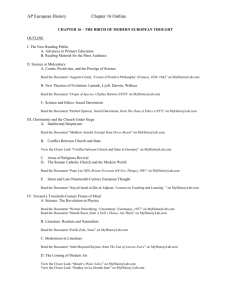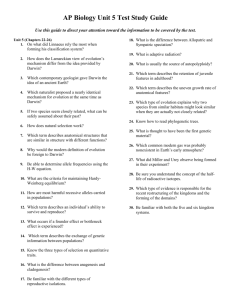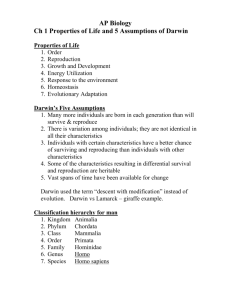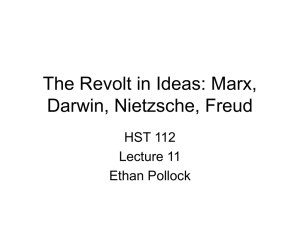IATL Pedagogic Intervention Grant New Interdisciplinary Spaces in Philosophy and Literature
advertisement
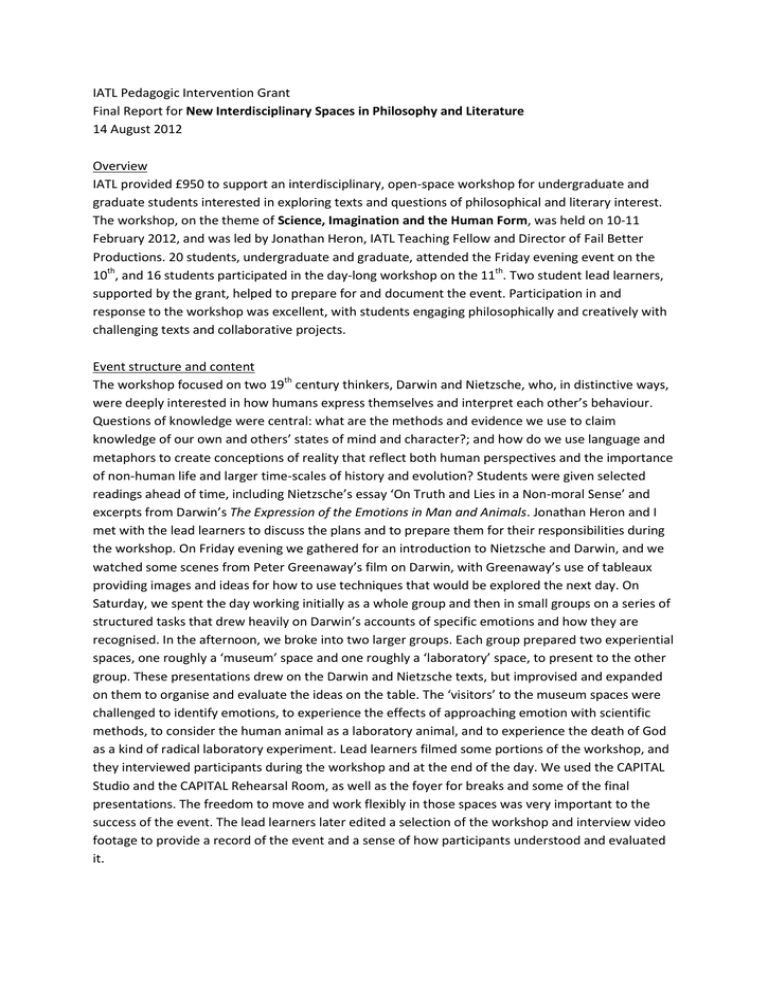
IATL Pedagogic Intervention Grant Final Report for New Interdisciplinary Spaces in Philosophy and Literature 14 August 2012 Overview IATL provided £950 to support an interdisciplinary, open-space workshop for undergraduate and graduate students interested in exploring texts and questions of philosophical and literary interest. The workshop, on the theme of Science, Imagination and the Human Form, was held on 10-11 February 2012, and was led by Jonathan Heron, IATL Teaching Fellow and Director of Fail Better Productions. 20 students, undergraduate and graduate, attended the Friday evening event on the 10th, and 16 students participated in the day-long workshop on the 11th. Two student lead learners, supported by the grant, helped to prepare for and document the event. Participation in and response to the workshop was excellent, with students engaging philosophically and creatively with challenging texts and collaborative projects. Event structure and content The workshop focused on two 19th century thinkers, Darwin and Nietzsche, who, in distinctive ways, were deeply interested in how humans express themselves and interpret each other’s behaviour. Questions of knowledge were central: what are the methods and evidence we use to claim knowledge of our own and others’ states of mind and character?; and how do we use language and metaphors to create conceptions of reality that reflect both human perspectives and the importance of non-human life and larger time-scales of history and evolution? Students were given selected readings ahead of time, including Nietzsche’s essay ‘On Truth and Lies in a Non-moral Sense’ and excerpts from Darwin’s The Expression of the Emotions in Man and Animals. Jonathan Heron and I met with the lead learners to discuss the plans and to prepare them for their responsibilities during the workshop. On Friday evening we gathered for an introduction to Nietzsche and Darwin, and we watched some scenes from Peter Greenaway’s film on Darwin, with Greenaway’s use of tableaux providing images and ideas for how to use techniques that would be explored the next day. On Saturday, we spent the day working initially as a whole group and then in small groups on a series of structured tasks that drew heavily on Darwin’s accounts of specific emotions and how they are recognised. In the afternoon, we broke into two larger groups. Each group prepared two experiential spaces, one roughly a ‘museum’ space and one roughly a ‘laboratory’ space, to present to the other group. These presentations drew on the Darwin and Nietzsche texts, but improvised and expanded on them to organise and evaluate the ideas on the table. The ‘visitors’ to the museum spaces were challenged to identify emotions, to experience the effects of approaching emotion with scientific methods, to consider the human animal as a laboratory animal, and to experience the death of God as a kind of radical laboratory experiment. Lead learners filmed some portions of the workshop, and they interviewed participants during the workshop and at the end of the day. We used the CAPITAL Studio and the CAPITAL Rehearsal Room, as well as the foyer for breaks and some of the final presentations. The freedom to move and work flexibly in those spaces was very important to the success of the event. The lead learners later edited a selection of the workshop and interview video footage to provide a record of the event and a sense of how participants understood and evaluated it. Summary This was a pedagogically innovative and stimulating event. To take the concerns and methods of Nietzsche and Darwin not only as objects of study, but as materials to try out for ourselves was in many ways appropriate to the practices and achievements of these thinkers. For interdisciplinary work in philosophy and literature, it is very important to get students to understand how imaginative and intellectual efforts combine in producing new ideas and possibilities for expression and understanding. The collaborative, practical and physical nature of the workshop gave students new ways of learning how to recognise and respond to issues of relevance within Nietzsche and Darwin and in relation to emotion and scientific knowledge in general. In closing, let me also thank IATL for supporting this event. It could not have happened without this support, and it was a highlight of the year for me and our students. Sincerely, Eileen John Department of Philosophy

